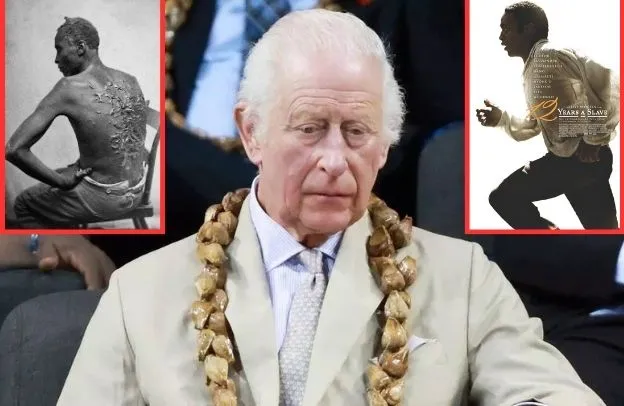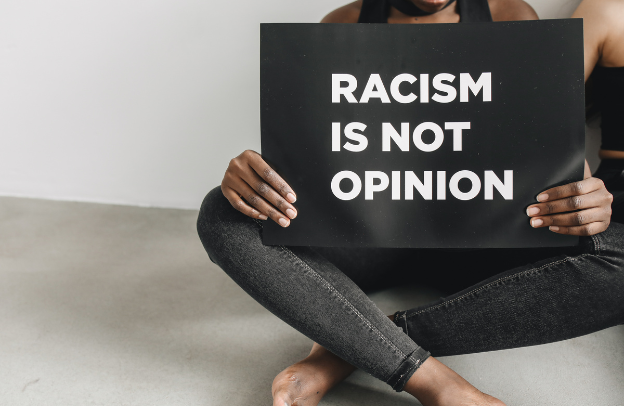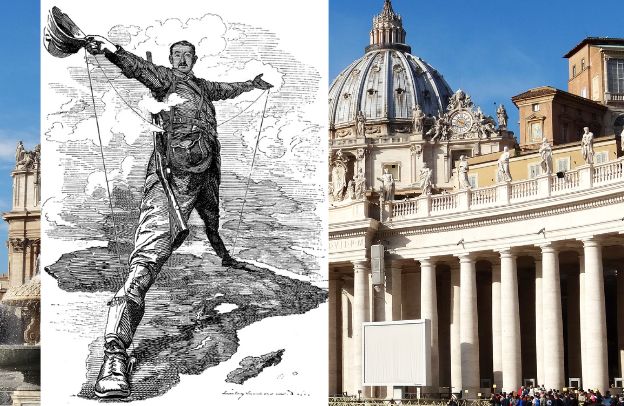King Charles III And The ‘Painful’ Legacy Of Slavery Amid Growing Calls For Reparations At Commonwealth Summit

As the Commonwealth summit convened in Samoa this October, King Charles III stood before an audience of global leaders, his words hanging in the air: “None of us can change the past,” he said, addressing the legacy of Britain’s involvement in the transatlantic slave trade.
Want to learn more about storytelling? Start by downloading the first chapter of The Storytelling Mastery.
While he called for “creative ways to right inequalities that endure,” there was no direct apology, nor any substantial commitment to reparations—a silence as deafening as the cries of those still suffering the intergenerational scars of colonialism.
His message, though carefully worded, struck a chord across the African diaspora, evoking calls for more than symbolic gestures.
You may be among those who feel the weight of this unresolved history, seeking reparative justice and real action that can begin to mend the broken bridges between continents.
The British Monarchy’s Role in the Transatlantic Slave Trade
If you’ve looked at history, you know that the British monarchy played a pivotal role in the transatlantic slave trade, establishing and sustaining an economic empire built on the backs of African men, women, and children.
Between the 16th and 19th centuries, Britain was responsible for the forced enslavement of over 3.1 million Africans, of whom more than 400,000 died en route to the Americas.
Below is a quote from the UK Parliament: “Over many years, Parliament, with royal support and backing, had facilitated the development of a large and growing enslaved African population in the British colonies.”
The article, The Transatlantic Slave Trade added that William Ewart Gladstone who served as Prime Minister four separate times between 1868 and 1894 is represented over a hundred times in the Parliamentary Art Collection. Meanwhile, his family made its vast wealth through the sugar trade, with his father, John Gladstone, owning many slaves and several plantations in the West Indies.
The trade generated immense wealth for British elites, including the monarchy, which actively supported and benefitted from it.
The impact of this horrendous trade is not just a historical artifact; it has woven itself into the very fabric of contemporary African geopolitics and economic struggles. From development disparities to debt cycles, the effects of exploitation have lingered, manifesting in enduring economic challenges that restrict the growth of former colonies.
Today, much of Africa and the African diaspora still experience the economic and social fallout of this legacy. African countries today are caught in cycles of poverty and instability which is rooted in centuries of resource extraction and human trafficking.
Modern Challenges Rooted in Historical Injustices
If you’re part of the African diaspora, you might recognize the challenges that are rooted in this history, from underfunded educational systems to economic barriers that limit opportunity.
African nations continue to grapple with crushing debt. According to the World Bank, the volume of nominal public debt of Sub-Saharan Africa (SSA) has more than tripled since 2010, to about $1.14 trillion at the end of 2022. See the World Bank publication, “Unlocking the Development Potential of Public Debt in Sub-Saharan Africa”.
See also Harnessing the Power of African Diaspora Heritage for Positive Change
Despite contributing only around 3% to global greenhouse gas emissions, the African continent faces some of the most severe impacts of climate change, with limited resources to combat these crises due to ongoing financial constraints.
The socioeconomic gap created by colonial exploitation, compounded by global inequities, holds back nations that could otherwise thrive. The legacy of the transatlantic slave trade doesn’t just haunt the past; it restricts the future.
In his address at the Commonwealth summit, King Charles III acknowledged the “painful aspects” of British colonial history but fell short of endorsing reparations. His statement echoed similar sentiments he made in Kenya in 2023 when he expressed “deep sorrow and regret” over colonial wrongdoings but avoided any promise of restitution.
Symbolic words, while meaningful to some, cannot address the material needs left in the wake of colonialism. Without tangible reparations, such gestures feel empty, especially in light of the lasting economic and social harm inflicted on African communities and the diaspora.
Why Reparations Matter: The Case for Financial Compensation and Systemic Redress
What would effective reparations look like, and why do they matter so much? You may have heard arguments against reparations, suggesting they are either impractical or a relic of past injustices.
Yet reparations are neither impractical nor backward-looking; they are essential to addressing systemic inequalities that stem directly from slavery and colonialism.
António Guterres, the Secretary-General of the United Nations, emphasized that no nation has adequately confronted the historical legacy of the mass enslavement of people of African descent.
See also How the African Diaspora is Pioneering Transpersonal Diplomatic Leadership
He underscored this point in a recent report, urging governments to explore the idea of financial reparations for transatlantic slavery. Guterres stated, “Those who were enslaved were not in a position to push for reparations, but their descendants who continue to suffer the impact of African chattel slavery are”
This statement aligns with ongoing discussions about reparations, highlighting the responsibility of contemporary societies to address the enduring consequences of slavery. Guterres’ comments also reflect a growing acknowledgment among international leaders that reparative justice is necessary for healing historical wounds and addressing systemic inequalities.
Financial reparations would help restore African nations and diaspora communities’ economic footing, allowing for investments in education, healthcare, and infrastructure—all vital for sustainable development.
See also Rose Gardens Speech on Economic Growth and Debt Reduction
In the Caribbean, the CARICOM Reparations Commission has taken the lead in articulating what meaningful reparations could look like. Their Ten-Point Plan calls for debt cancellation, a formal apology, and institutional funding for development, recognizing that reparations must go beyond individual compensation to address systemic harms.
CARICOM’s approach provides a model that could be adapted for African nations and diaspora communities worldwide, setting a precedent for reparations that are comprehensive, impactful, and attuned to the needs of affected communities.
Building the Reparations Movement: The Role of the African Diaspora
As part of the African diaspora, you play a vital role in advocating for reparative justice. Organizations like the African American Reparations Commission and the African Union’s African Diaspora Committee have amplified these calls, fostering a global network of advocates who are demanding systemic change.
By coming together, you contribute to a powerful movement that challenges former colonial powers to acknowledge and address the legacies of their actions.
The recent acknowledgment from King Charles III, while limited, reflects the growing influence of this collective voice, which has pushed discussions on reparations into the mainstream.
Beyond financial compensation, reparations encompass a broader scope: they include educational investments, institutional funding, and the return of stolen cultural artifacts.
According to a CBS News article titled “African Nations Want Their Stolen History Back,” a significant portion of Africa’s cultural heritage was looted during colonial times and has since been housed in museums and private collections across Europe and North America.
Experts are now calling for a faster process to return these artifacts, emphasizing the importance of restoring cultural heritage to its rightful owners. This ongoing dialogue reflects a broader movement advocating restitution and recognition of historical injustices linked to colonialism.
For years, African countries and diaspora communities have long called for the repatriation of these artifacts, which sit in museums across Europe and the United States, where they are celebrated as “world heritage” rather than respected as symbols of African identity and resilience.
You might also like Arikana Chihombori-Quao: Champion of African Unity, Diaspora Engagement, and Economic Empowerment
Returning these artifacts would not only be an act of restitution but a powerful gesture of respect and recognition.
Beyond Apologies: Forging a Path Forward
The African diaspora’s call for reparations isn’t about blame; it’s about justice, fairness, and a commitment to healing. You understand that an apology, while meaningful, does little to bridge the economic and social chasms created by centuries of exploitation.
To move forward effectively, you need actions that go beyond rhetoric—concrete steps that acknowledge the damage and work to repair it.
One pathway to this is debt forgiveness. In 2021, the IMF reported that low-income countries in Africa spend over 40% of their revenue on debt repayment. If former colonial powers and international organizations forgave or restructured this debt, it could free up critical resources for development.
This form of reparative justice would allow African nations to invest in their future, unburdened by financial obligations that often date back to the colonial era. Debt forgiveness could be paired with increased investment in sustainable infrastructure, healthcare, and educational initiatives to empower African nations.
Another solution lies in creating economic partnerships that go beyond aid and dependency.
Rather than paternalistic aid models, genuine partnerships could foster mutual growth and empower African nations and the diaspora. The Commonwealth, representing 56 nations and a third of humanity, could be an ideal platform for these partnerships.
That if there is a genuine commitment to fair trade agreements, development funding, and inclusive policies that recognize the economic inequalities rooted in colonial history.
In his speech, King Charles mentioned finding ways to “discuss the most challenging issues with openness and respect.” A true partnership would honor these words through action, enabling economic equity rather than perpetuating dependency.
The Collective Power of Unity
As a member of the African diaspora, you are part of a global family, spanning continents and bound by a shared history of resilience. The reparations movement isn’t just about righting past wrongs; it’s about empowering future generations.
By uniting across borders, you can harness the strength of the African diaspora to advocate for policies that promote justice, equity, and opportunity. Your voice, along with others in the movement, has the potential to inspire change on a global scale, reminding the world that justice delayed is justice denied.
See also Leverage Your Story and Amplify Your Voice: Owning Your Story for a Deeper Purpose, Pt. 6
You can look to the resilience of leaders in Africa and the Caribbean who continue to demand reparations as a testament to this collective strength. From Barbados Prime Minister Mia Mottley, who has been a vocal advocate for reparations, to grassroots organizations in Ghana and Nigeria, there is a shared commitment to rewriting the narrative.
This narrative doesn’t erase the pain of history, but it does transform it into a force for change, guided by the belief that true justice cannot be achieved without accountability.
Conclusion: A Call to Action for a Just Future
As the Commonwealth seeks to address “the most challenging issues with openness and respect,” now is the time to turn words into action.
See also Lecture on Haiti, 1893 – Frederick Douglass Series
For King Charles III and the British government, the opportunity to lead by example has never been clearer. Reparations are not a radical idea; they are a necessary step toward a future where African and African diaspora communities can thrive, unburdened by the legacies of exploitation.
The path forward requires collaboration, courage, and an unwavering commitment to justice.
It calls for more than symbolic gestures—it demands real action, from debt forgiveness and economic partnerships to the return of cultural artifacts and targeted investments in education and infrastructure. That is what we are looking for.
Want to learn more about storytelling? Start by downloading the first chapter of The Storytelling Mastery.




